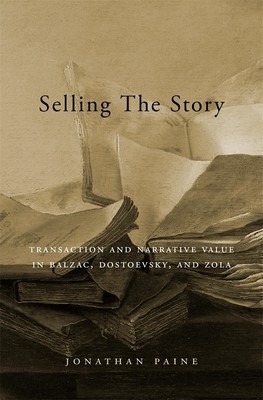
- We will send in 10–14 business days.
- Author: Jonathan Payne
- Publisher: Harvard University Press
- ISBN-10: 0674988434
- ISBN-13: 9780674988439
- Format: 16.3 x 23.6 x 2.8 cm, kieti viršeliai
- Language: English
- SAVE -10% with code: EXTRA
Reviews
Description
A literary scholar and investment banker applies economic criticism to canonical novels, dramatically changing the way we read these classics and proposing a new model for how economics can inform literary analysis.
Every writer is a player in the marketplace for literature. Jonathan Paine locates the economics ingrained within the stories themselves, revealing how a text provides a record of its author's attempt to sell the story to his or her readers. An unusual literary scholar with a background in finance, Paine mines stories for evidence of the conditions of their production. Through his wholly original reading, Balzac's The Splendors and Miseries of Courtesans becomes a secret diary of its author's struggles to cope with the commercializing influence of serial publication in newspapers. The Brothers Karamazov transforms into a story of Dostoevsky's sequential bets with his readers, present and future, about how to write a novel. Zola's Money documents the rise of big business and is itself a product of Zola's own big business, his factory of novels. Combining close readings with detailed analyses of the nineteenth-century publishing contexts in which prose fiction first became a product, Selling the Story shows how the business of literature affects even literary devices such as genre, plot, and repetition. Paine argues that no book can be properly understood without reference to its point of sale: the author's knowledge of the market, of reader expectations, and of his or her own efforts to define and achieve literary value.EXTRA 10 % discount with code: EXTRA
The promotion ends in 21d.05:16:05
The discount code is valid when purchasing from 10 €. Discounts do not stack.
- Author: Jonathan Payne
- Publisher: Harvard University Press
- ISBN-10: 0674988434
- ISBN-13: 9780674988439
- Format: 16.3 x 23.6 x 2.8 cm, kieti viršeliai
- Language: English English
A literary scholar and investment banker applies economic criticism to canonical novels, dramatically changing the way we read these classics and proposing a new model for how economics can inform literary analysis.
Every writer is a player in the marketplace for literature. Jonathan Paine locates the economics ingrained within the stories themselves, revealing how a text provides a record of its author's attempt to sell the story to his or her readers. An unusual literary scholar with a background in finance, Paine mines stories for evidence of the conditions of their production. Through his wholly original reading, Balzac's The Splendors and Miseries of Courtesans becomes a secret diary of its author's struggles to cope with the commercializing influence of serial publication in newspapers. The Brothers Karamazov transforms into a story of Dostoevsky's sequential bets with his readers, present and future, about how to write a novel. Zola's Money documents the rise of big business and is itself a product of Zola's own big business, his factory of novels. Combining close readings with detailed analyses of the nineteenth-century publishing contexts in which prose fiction first became a product, Selling the Story shows how the business of literature affects even literary devices such as genre, plot, and repetition. Paine argues that no book can be properly understood without reference to its point of sale: the author's knowledge of the market, of reader expectations, and of his or her own efforts to define and achieve literary value.

Reviews